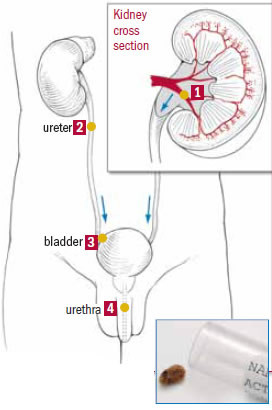Preventing kidney stones
Drink water and cut back on sodium and animal protein to avoid kidney stones or to keep them from coming back.
- Reviewed by Howard E. LeWine, MD, Chief Medical Editor, Harvard Health Publishing; Editorial Advisory Board Member, Harvard Health Publishing
If you've ever had a kidney stone, you surely remember it. The pain can be unbearable, coming in waves until the tiny stone passes through your urinary plumbing and out of the body. Kidney stones are more common in men than in women, and they tend to recur. In about half of people who have had one, kidney stones strike again within seven years without preventive measures.
Preventing kidney stones is not complicated, but it does take some determination. It means drinking plenty of fluids and following a diet that is low in sodium, with limited animal protein and age-appropriate intake of calcium.
Where do kidney stones get stuck? |
|
|
Causes of kidney stones
Kidney stones form when certain chemicals become concentrated enough in your urine to form crystals. The crystals grow into larger masses (stones), which may make their way through the urinary tract. If the stone gets stuck somewhere and blocks the flow of urine, it causes pain.
Most stones occur when calcium combines with one of two substances: oxalate or phosphorous. Stones can also form from uric acid, which forms as the body metabolizes protein.
To prevent kidney stones, you need to prevent the conditions that make stones more likely to form. Here are the most important steps:
Drink plenty of water: Drinking extra water dilutes the substances in urine that lead to stones. Strive to drink enough fluids to pass 2 liters of urine a day, which is roughly eight standard 8-ounce cups. It may help to include some citrus beverages, like lemonade and orange juice. The citrate in these beverages help to block stone formation.
Get the calcium you need: Getting too little calcium in your diet can cause oxalate levels to rise and cause kidney stones. To prevent this, make sure to take in an amount of calcium appropriate to your age. Ideally, obtain calcium from foods, since some studies have linked taking calcium supplements to kidney stones.
Reduce sodium: A high-sodium diet can trigger kidney stones because it increases the amount of calcium in your urine. A low-sodium diet is therefore recommended for the stone prone. Federal guidelines suggest limiting total daily sodium intake to 2,300 mg. If sodium has contributed to kidney stones in the past, try to reduce daily sodium to 1,500 mg.
Limit animal protein: Eating too much animal protein, such as meat, eggs, and seafood, boosts the level of uric acid and could lead to kidney stones. A high-protein diet also reduces levels of citrate, the chemical in urine that helps prevent stones from forming. If you're prone to stones, limit your daily meat intake to a quantity that is no bigger than a pack of playing cards. This is also a heart-healthy portion.
Avoid stone-forming foods: Beets, chocolate, spinach, rhubarb, tea, and most nuts are rich in oxalate, and colas are rich in phosphate, both of which can contribute to kidney stones. If you suffer from stones, your doctor may advise you to avoid these foods or to consume them in smaller amounts.
For everyone else, particular foods and drinks are unlikely to trigger kidney stones unless consumed in extremely high amounts. Some studies have shown that men who take high doses of vitamin C in the form of supplements are at slightly higher risk of kidney stones. That may be because the body converts vitamin C into oxalate.
What a doctor can do for you
Individuals with recurrent episodes of kidney stones should have an evaluation to determine what factors may have contributed to the stones. Based on the tests, your doctor can provide specific dietary advice and, in some cases, medications and dietary supplements.
About the Reviewer

Howard E. LeWine, MD, Chief Medical Editor, Harvard Health Publishing; Editorial Advisory Board Member, Harvard Health Publishing
Disclaimer:
As a service to our readers, Harvard Health Publishing provides access to our library of archived content. Please note the date of last review or update on all articles.
No content on this site, regardless of date, should ever be used as a substitute for direct medical advice from your doctor or other qualified clinician.
















